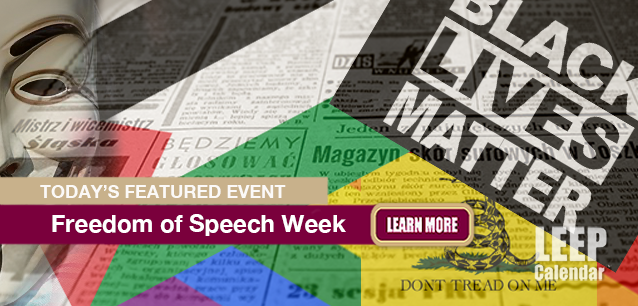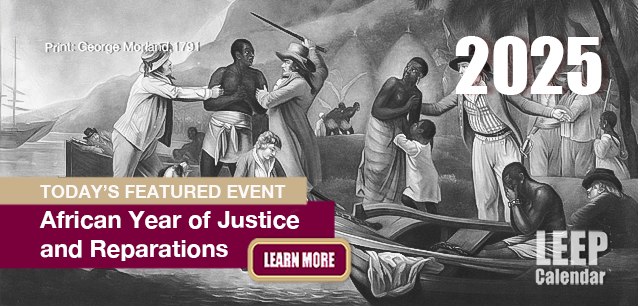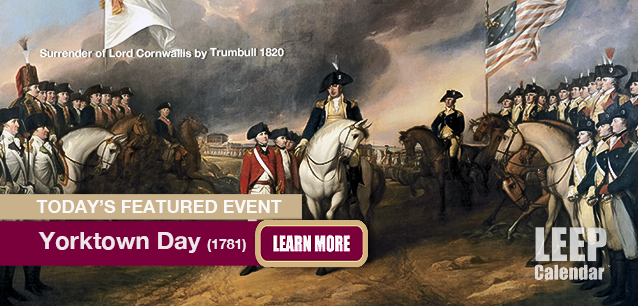 AD
AD
Country
- Africa
- Alcohol, Tobacco & Drugs
- Animals, Fish, Insects & Birds
- Anniversaries
- Australia
- Books
- Brazil & S.America
- Buddhism
Category
- Afghanistan, AF
- Aland Island, AX
- Albania, AL
- Algeria, DZ
- American, Samoa, AS
- Andarra, AD
- Angola, AO
- Anguilla, Al
Event Type
- Daily
- Weekly
- Annual
- Recurring
Duration
- All
- 1 Day
- 2 Day
- 3 Day
- 4 Day
- 5 Day
- 6 Day
Event Type
- Daily
- weekly
- Annual
- Recurring
Event Type
- Daily
- weekly
- Annual
- Recurring
Today is: October 19
Birth of the Baha'u'llah, (1817)
Daylight Savings (BR), Begins
Evaluate Your Life Day, Ntl.
Gin and Tonic Day, Intl. (2010)
LGBTQ+ Center Awareness Day
Seafood Bisque Day
Sunday School Teachers Appreciation Day
Tuk Tuk Polo (LK)
Yorktown Day, Virginia (US-VA)(1781)
ACE Week
Adoption Week, Ntl. (UK)
Baking Week, Ntl. (UK)
Black in Natural History Museums Week
Bone and Joint Action Week, Ntl.
Bullying Bystanders Unite Week
Businesswomen's Week, Ntl.
Character Counts Week, Ntl.
Chemistry Week, Ntl.
Digital Parenting Week (UK)
Diwali (Deepavali) (H)
Estate Planning Awareness Week, Ntl.
Food and Drug Interaction Education Week
Forest Products Week, Ntl.
Freedom of Speech Week
Friends of Libraries Week, Ntl.
HIP Week (CA)
Health Education Week, Ntl.
Healthcare Quality Week, Intl.
Heritage Week, Ntl., (JM)
IMF World Bank Summit (US-DC)
Lead Poisoning Prevention Week of Action, Intl.
Male Breast Cancer Awareness Week, Ntl.(US/CA/AU)
Massage Therapy Week, Ntl.
Medical Assistants Week
Minority Enterprise Development Week, Ntl.
Newspaper Week (JP)
Nuclear Science Week, Ntl.
Pastoral Care Week
Red Bull Tuk Tuk Tournament (LK)
Respiratory Care Week, Ntl.
Retirement Security Week, Ntl.
Rodent Awareness Week, Ntl.
School Bus Safety Week, Ntl.
School Safety Week, Ntl (CA)
Schools Week, America's Safe
Sock it to Suicide Week (AU)
Storytelling Festival, Scottish Intl. (UK)
Stuttering Awareness Week, Intl.
Teen Driver Safety Week, Ntl.
Temperature Check Week, Ntl.
Towns Week, Ntl. (PH)
Wolf Awareness Week, Intl
World Series MLB
YWCA Week Without Violence
ADHD Awareness Month
Adopt-a-Dog Month, (AHA)
Adopt-a-Shelter Dog Month
Alcohol Awareness Month, Collegiate Ntl.
Animal Safety and Protection Month, Ntl.
Antidepressant Death Awareness Month
Anxiety and Depression Awareness Month (AU)
Apple Month, Ntl.
Applejack Month
AquaTober
Architecture Month, Archtober
Arts and Humanities Month, Ntl.
Audiology Awareness Month, Ntl.
Autism Awareness Month (CA)
Bake and Decorate Month, Ntl.
Bat Appreciation Month
Battery Safety Month (Auto)
Bi-national Health Week (US/CA/MX-varies locally)
Big Draw, The
Bilingual Child Month, Celebrating the
Black History Month (UK)
Black Speculative Fiction Month
Bleeding Disorders Month, Ntl. (AU)
Blind Month, National Meet the
Blindness Awareness Month
Book Month, Ntl.
Breast Cancer Awareness Month, Ntl.
Bullying Month, Stop, Ntl.
Bullying Prevention Month, Ntl.
Caffeine Addiction Recovery Month
Car Care Month, Ntl. Fall
Caramel Month, Ntl.
Celiac Awareness Month (US)
Cheese Month, American
Chili Month, Ntl.
Chiropractic Health Month, Ntl.
Church Library Month
Church Safety and Security Month, Ntl.
Class Reunion Month
Clergy Appreciation Month
Co-op Advertising Awareness Month
Co-op Awareness Month
Company Culture Month, Global
Company Culture Month, Global
Computer Learning Month
Contact Lens Safety Month
Cookie Month
Corn Month
Country Ham Month
Country Music Month
Crime Prevention Month, Ntl.
Critical Illness Awareness Month
Cybersecurity Month, Ntl.
Danger Run (US-KY, IN, IL)
Dental Hygiene Month, Ntl.
Depression Education and Awareness Month
Dessert Month, Ntl.
Disability Employment Awareness Month
Diversity Awareness Month, Global
Domestic Violence Awareness Month
Down Syndrome Month, Ntl.
Dyslexia Awareness Month
Eat Better—Eat Together Month
Eczema Awareness Month
Emotional Intelligence Awareness Month
Energy Action Month, Ntl.
Ergonomics Month, Ntl.
Eye Injury Prevention Month
Fair Trade Month
Family History Month
Festival of Penha (BR-RJ)
Filipino American History Month (1587)
Financial Planning Month
Freethought, Month of, Ntl.
Gain the Inside Advantage Month, Ntl.
Gay and Lesbian History Month (1979)
German-American Heritage Month (1683)
Girls Night In (AU)
Go Sober Month (UK)
Golf Month, Australia
Great Cycle Challenge (AU)
Halloween Safety Month
Head Start Awareness Month
Health Literacy Month
Healthy Lung Month
Healthy Workplace Month (CA)
Hog-out Month (US-TX)
Home Eye Safety Month
Indigenous Peoples Month, Ntl. (PH)
Indoor Air Quality (IAQ) Month, Ntl.
Islamic History Month (CA)
Italian-American Heritage Month (1492)
Kartika (H)
Katik (S)
Kitchen and Bath Month, Ntl.
Learning Disabilities Month, Ntl. (CA/US)
Learning and Development Month, Ntl.
Liver Awareness Month, Ntl.
Long Term Care Planning Month
Lupus Awareness Month (UK)
Medical Librarians Month, Ntl.
Medicine Abuse Awareness, Ntl.
Menopause Month, World
Museums and Galleries Month (PH)
Muslim American Heritage Month (US)
Non-GMO Month, Ntl.
Organize Your Medical Information Month
Orthodontic Health Month, Ntl.
Pasta Month, Ntl.
Pedestrian Safety Month
Pescatarian Month, Ntl.
Pet Wellness Awareness Month, Ntl.
Pharmacist Month, American
Photographer Appreciation Month
Physical Therapy Month, Ntl.
Pickled Peppers Month
Pink Ribbon Breakfast (AU)
Pit Bull Awareness Month, Ntl.
Pituitary Awareness Month (UK)
Pizza Month, Ntl. (1984)
Polio Awareness Month, (CA/AU)
Polish-American Heritage Month
Popcorn Poppin' Month, Ntl.
Positive Attitude Month
Prenatal-onset GBS Disease Recognition Month
Pretzel Month, Ntl.
Principal's Month, Ntl.
Protect Your Hearing Month, Ntl.
Rabi al-Thani (M)
Reading Group Month, Ntl. (1917)
Rett Syndrome Awareness Month
Roller Skating Month, Ntl.
STEM Mentoring Month
Sarcastic Awareness Month
Sausage Month, Ntl.
School Libraries Month, Intl.
Seafood Month
Seed Gathering Seasons (UK)
Senior's Month (AU-QLD)
Sensory Awareness Month, Ntl.
Shoctober - Defibrillator National Awareness Month (AU)
Spina Bifida Awareness Month, Ntl.
Spinach Lovers Month
Spinal Health Month, Ntl.
Squirrel Awareness and Appreciation Month
Stamp Collecting Month, Ntl
Stop America's Violence Everywhere (SAVE) Month
Substance Abuse Preservation Month, Ntl.
Sudden Infant Death Syndrome (SIDS) Awareness Month
Sunday School Teacher Appreciation Month
Teentober
Tishrei (J)
Turner Prize Exhibition (UK)
U.S.-Mexico Border Health Month
Ultrasound Awareness Month
Unblocktober (UK)
Urban October
Vegetarian Month
Walk To School Month, Intl.
Wild About Gardens Week (UK)
Window Covering Safety Month, Ntl.
Winter Weather Preparedness Weeks (Varies by Location)
Wishbones for Pets (US/CA)
Women's History Month (CA)
Women's Small Business Month
Work and Family Month, Ntl.
Workplace Politics Awareness Month
Youth Justice Action Month, Ntl.
LEEP Calendar
Scroll to explore events active on this date.
Additional Events on LEEP
LEEP INK FEATURES

August? Absolutely!
In August, we live through the Dog Days of Summer. It's hot and often humid, and those who can leave for better climates do. Down south, winter is in full force. August is also known as "the ...

In The Heat of July: July 2025 Events
Is it hot enough (or cold enough if you're below the equator) for you yet? There is actually a day for that! Like every month, I pick a diverse collection of events you may or may not know about. This ...

May Blooms: Events in May 2025
Along with October, May is one of the most densely packed months of the year. It's before the summer humidity and the last whole month of the school year. The weather is warming in t...
About the Historical Anniversary of the Founding of OPEC
Politics
Ends: Sep 10, 2024
DESCRIPTION:
September 10 marks the anniversary of the Organization of Petroleum Exporting Countries (OPEC) creation in 1960. This organization aims to coordinate and unify the policies on petroleum among its member nations to create fair trade and prices of oil and its derivatives; create a regular supply of petroleum to consuming countries, and provide a reasonable return on capital for petroleum-producing nations. For the first five years, its headquarters were in Geneva. On September 1, 1965, it moved to Vienna, Austria.
Five countries founded OPEC: Saudi Arabia, Iran, Iraq, Kuwait, and Venezuela. Qatar, Indonesia, Libya, United Arab Emirates, Algeria, Nigeria, Ecuador, Angola, and Gabon joined later.
OPEC originated in Baghdad in September 1960 following changes in the international economic and political arena and the creation of newly independent states. The organization promoted a unifying vision and shared objectives. During the 1950s, the oil market was dominated by large multinational companies and the Soviet Union. OPEC changed that, focusing on the needs of the supplier nations rather than the corporations.
Within a decade, the member countries achieved dominance over their domestic petroleum production and collectively impacted the price of petroleum on the world market.
OPEC's collective power became apparent after the Yom Kippur War of 1973. In protest of the United States and its allies arming Israel, OPEC embargoed the nations, cutting off the supply of oil and banning the export of petroleum products. The effect was immediate. Americans and others worldwide found themselves waiting in hours-long lines to fill their gas tanks. Prices soared. The embargo lasted six months, and consumers worldwide learned a harsh lesson. Not only was the world dependent upon petrol, but OPEC was a power.
The actual cost of the oil embargo continues to resonate in America. Consider the auto industry. Though not the only cause, the embargo escalated events and provided opportunities that may have required several decades to occur without it.
During the fall of 1973, Americans were in shock. With petrol's scarcity and expense, the large American-made cars with massive engines and little fuel efficiency suddenly became undesirable. Though considered lower quality at the time, Japanese cars were less expensive, smaller, and fuel efficient. Brands including Datsun (Nissan), Honda, and Toyota rapidly stole market share from American manufacturers, forcing the closing of factories and the movement of supporting companies overseas. By 1980, US manufacturers were in a tailspin, and the high-paying blue-collar jobs supported by the industry were in jeopardy, sending entire regions of the nation into despair. Many of these areas never recovered. Today, Toyota is the top-selling auto brand in the United States, and Ford is number two.
***
The shift in automobile markets is one example of the fallout from the 1973 oil embargo and illustrates OPEC's power in influencing current and future events. The organization continues to protect its members' interests, which is its purpose.
Thankfully, it hasn't used its embargo power again.
VIDEOS
Currently, this event does not have supporting videos.
SUPPORTING DOCUMENTS
Currently, this event does not have supporting documents.
ADDITIONAL IMAGES
Currently, this event does not have supporting images.
Where would you like to go now?
 AD
AD
By using this site. You are agreeing to use of cookies. Learn more in our Privacy Policy
/footer-logo.svg)
LEGAL: Excerpts and links may be used, provided that full and clear attribution is given to Jubilee LLC and LEEPCalendar.com, with appropriate and specific direction to the original content (Page URL). Additional documents, embedded videos and additional image rights retained by their creators and are provided to increase understanding of the event or topic.
Jubilee LLC reserves the right to accept or reject inclusion of events in this calendar. The appearance of an event in LEEP Calendar does not imply endorsement of the event, nor the organization championing the event by Jubilee LLC, its stakeholders, customers or subsidiaries. All dates, contact information, URLs, addresses, and information relating to any event, promotion or holiday are subject to change without notice and should be treated as estimated. Jubilee LLC, our stakeholders, customers and subsidiaries cannot warrant accuracy. Users of this application are solely responsible for verifying actual event date with organizers and additional sources prior to committing resources, financial, human or otherwise.














































































